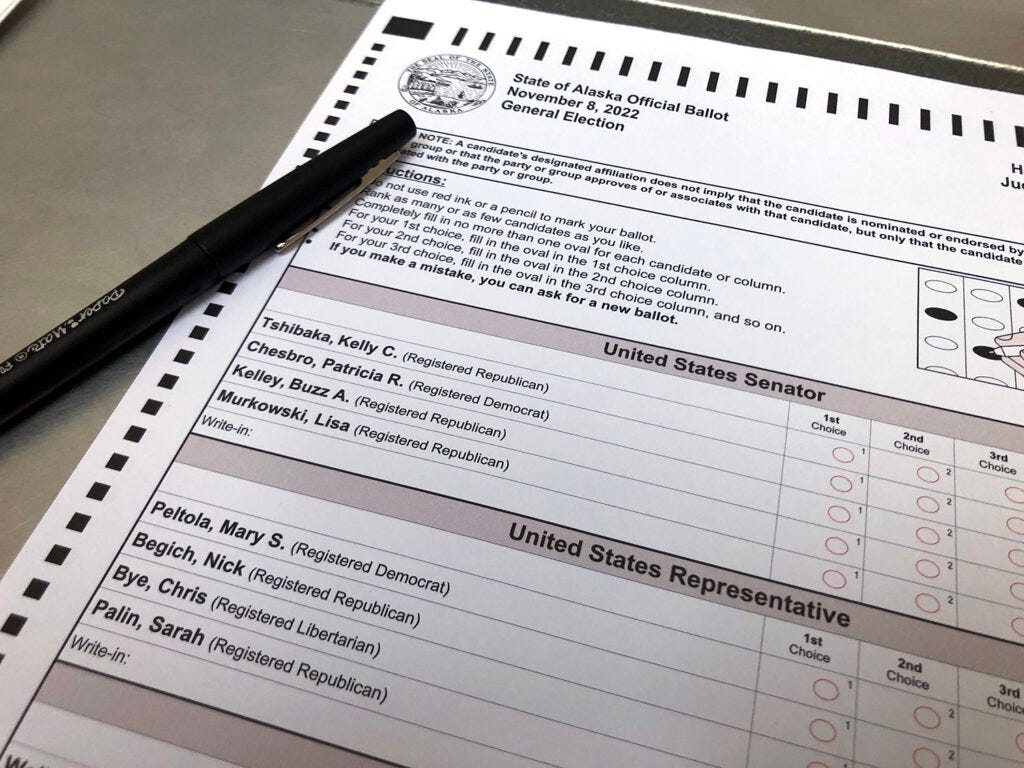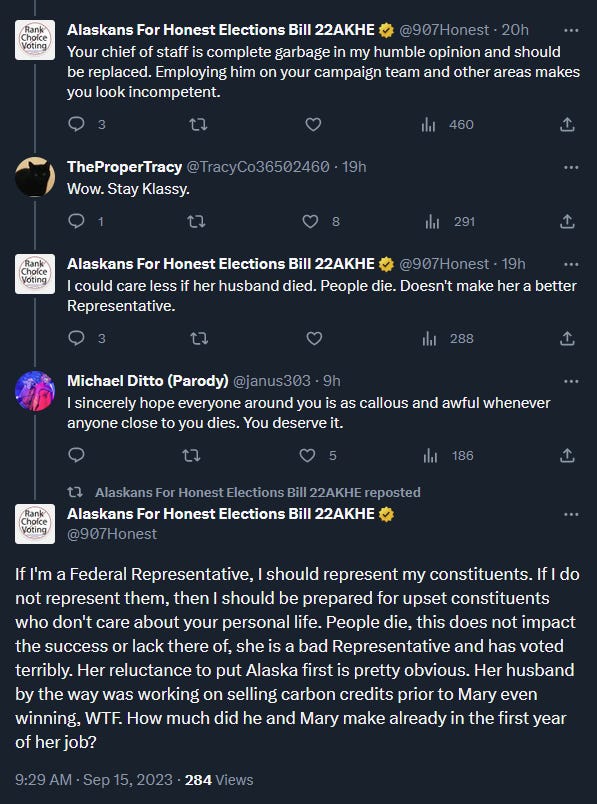Happy Friday, Alaska! It’s Sept. 15.
In this edition: Alaska campaign regulators released their report on the sprawling campaign targeting the state’s open primary and ranked-choice voting system for repeal. That’d be the one utilizing a “church” in Washington for what are definitely totally legitimate reasons. It recommends particularly hefty fines for a litany of failures to follow election laws, with the most severe saved for a $90,000 contribution that the lead backer filtered through said church. Also, a look at what it says about the state of campaigning in Alaska and the campaign itself. Also, we’ll close it out with the reading list and weekend watching.
Current mood: 😡
Programming note: Whew! It’s been a summer of a lot of travel—everyone’s getting married!—but things are starting to settle down on my end, and I’m looking forward to what will hopefully be a more regular posting schedule.
‘The harm suffered by the public was substantial’
The tangled web of campaigns working to overturn Alaska’s open primaries and ranked-choice voting system—led by a group calling itself Alaskans for Honest Elections—lied to the public and violated a litany of state election laws. That’s according to a report by state campaign finance regulators, which recommended nearly $60,000 fines against the Alaskans for Honest Elections, its organizers and several groups in its orbit.
The long list of violations is laid out over the course of the 31-page report. It boils down to a general disregard for the basic tenets of Alaska campaign disclosure laws. There are failures to register as campaign groups, failures to report expenditures in a timely fashion, and failures to include accurate “paid for by” disclaimers.
The staff report recommends the commissioners impose $59,205 in fines out of a statutory maximum of $343,000, chalking most of it up to the inexperience of first-time filers. That’s not all that unusual. Most campaign fines in Alaska accrue daily, resulting in sky-high maximum penalties regularly reduced by the time they’re imposed. Still, nearly $60,000 in penalties is high by even APOC standards.
But perhaps the most eye-popping violation is a $90,000 contribution that far-right activist Art Mathias illegally masked by filtering it through the Ranked Choice Education Association, which is preposterously set up as a church in Washington state, and into Alaskans for Honest Elections. One of the most fundamental purposes of Alaska’s campaign disclosure laws is to understand who is working to influence our elections, who’s funding them and how they’re spending that money. Here, Mathias masked his contribution while publicly claiming a broad support network.
APOC staff said that was no mistake or the result of inexperienced filers.
“A contribution must be made in the name of the true source of the money or thing of value – a person may not contribute using the name of another; or use a third-party conduit,” explained the report, reviewing their findings from the investigation. “On these facts, staff concludes that the weight of the evidence establishes that Mr. Mathias contributed his funds to RCEA knowing that they would be repurposed to support AHE through contributions as needed and thereby violated (state law).”
While the original complaint accused Mathias and his allies of setting up the Ranked Choice Education Association to obtain tax breaks for their election contributions, the APOC report notes that it’s well outside its power to investigate. Alaskans for Better Elections, the group that filed the initial complaint, said in a news release that it has since filed a complaint with the IRS.
Under the letter of the law, the maximum penalty for masking his contribution is equal to the size of the contribution, $90,000. Mathias could face another $8,300 fine for failing to report the contribution to the state regulators personally.
On that front, the APOC staff recommended fines amounting to $22,500 against Mathias and another $19,935 fine against the RCEA. While that’s a reduction from the statutory maximum, the staff said the seriousness of the violation should deter commissions from considering any further reductions.
“Staff does not recommend further reduction because, given the size of the contribution, staff believes that the harm suffered by the public was substantial.”
The outcome of the investigation and precise penalties will be left up to APOC commissioners to decide at an upcoming meeting. It’s also possible that the group could appeal any fines to the court system, and the group has already brought on disgraced former Attorney General Kevin Clarkson as its legal counsel.
Why it matters
For a campaign that labels itself as “Honest,” there’s nothing honest about it.
In the bigger picture, it’s illustrative of a growing strategy of some conservative campaigns to treat the penalties for flouting state law as the cost of doing business. Anchorage Mayor Dave Bronson’s campaign racked up huge fines, Kelly Tshibaka got popped with a fishing violation in her Senate campaign and is now facing a new round of penalties with her campaign against ranked-choice voting, and the Republican campaigns backing Gov. Mike Dunleavy are still in the courts battling the regulators’ efforts to hold them accountable by essentially arguing, “We won!”
As I said above, these reporting requirements are intended to give the public insight into who is attempting to influence our elections. Incomplete and late reporting hide that information from the public, and they’re typically only resolved once someone brings a complaint to APOC. Stall tactics, as we saw with the pro-Dunleavy PACs heading into the 2022 election, can draw out that process well after the votes are cast.
Here, Mathias and company have worked to foster an image of “honesty” with a broad support base when the investigation shows that’s not the case. It’s a campaign that is primarily the work of a handful of individuals deeply motivated by the simple fact that open primaries—when everyone gets to pick the slate of candidates rather than the smaller, more partisan pool of the state’s old semi-closed primaries—just aren’t that friendly to far-right extremists.
And, hey, if you need any other read on who the people behind the effort to repeal Alaska’s open primary system and ranked-choice voting are, take a look at what they had to say in the comments of U.S. Rep. Mary Peltola’s tweet thanking people for the kindness in the wake of the death of her husband, Buzzy:
As Scott Kendall, the prolific attorney who is well-acquainted with filing APOC complaints and filed the one that led to the aforementioned report, put on Twitter:
“In politics, it takes a lot to shock me. When the people who want to repeal Ballot Measure 2 formed a fake church to run a campaign through, THAT shocked me,” he said. “But this… this just disgusts me. Regardless of politics, there’s no excuse to treat another human this way.”
Stay tuned.
Reading list
Alaska flu cases increased last year, spiking in early winter, while vaccine rates lagged
Alaska’s Health Department works through one food stamp backlog only to confront another
Video shows F-16 fighter jet dropping flares above Anchorage Hillside during Biden visit
Juneau is at the forefront of Alaska’s burgeoning pinball scene
Weekend watching
Looking for something a bit lighter, I’ve really fallen in love with the British comedy show Taskmaster which sets its contestants up with some fairly ridiculous challenges, like making a huge block of ice disappear the fastest. They also have full episodes on their YouTube page, too. Enjoy!
Have a nice weekend, y’all.





